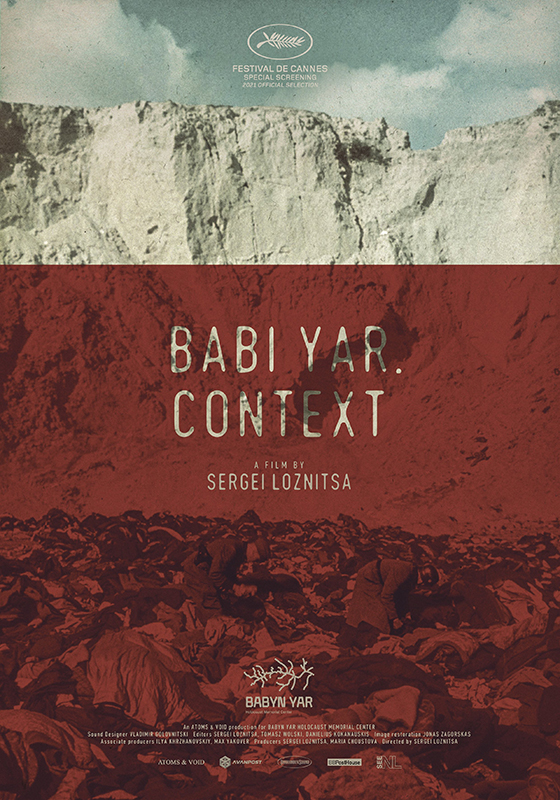In Sergie Loznitsa’s new documentary film, Babi Yar. Context, the decade spanning the Nazi invasion of Ukraine through the ensuing war crimes trial is explored using only archival footage and the occasional title card. Babi Yar (Babyn Yar) is a ravine outside the Ukrainian capital of Kyiv where on September 29-30, 1941, the Nazi Regime massacred an estimated 33,771 Jewish people. The result is a stark, uncompromising exploration of war and genocide that enlists the viewer in bearing witness to one of history’s most notorious atrocities.
Loznitsa has assembled his film using footage from German, Russian, and Ukrainian archives and private collections. Much of it was shot amateurly by occupying German soldiers. We see the initial bombardment of the Ukrainian countryside by heavy artillery with tall plumes of smoke billowing up from the idyllic countryside. The Ukrainians move about purposefully, but not in a rush, as if the war happening around them is but a casual new reality. Much of the footage contains this odd verisimilitude -- the banal juxtaposed with the monstrous.
The Germans easily take the towns outside Kyiv and eventually the city itself. There is a certain jubilation among the Ukrainian people at their liberation from Stalin. This is the same decade where Stalin engineered a manufactured famine that killed millions of Ukrainians. Images of the Soviet dictator are torn down and replaced with posters of Hitler. A visiting Nazi general is heaped with flowers and smiling women parade through the streets wearing traditional Ukrainian dresses. More ominously, there is footage of a massive trench being dug entirely by Ukrainian women, stripped down to their bras in the hot midday sun, under Nazi supervision.
The Nazis follow a familiar playbook once they have conquered the region. In Lemberg (now Lviv), horrific black and white reel shows the Ukrainians themselves driving Jewish people naked through the streets, beating them, and tossing them in the mud. Titles inform us that Germans have blamed the local Jewish population for the murder of Ukrainians at a Soviet secret police headquarters. In Kyiv, the Soviets set off explosives in the middle of the city, killing civilians and soldiers alike. This sets the stage for the roundup of the city’s Jewish population, who are quickly blamed for the attack.
Since there is no footage of the executions at Babi Yar, we see only photographs of the Jewish people of Kyiv waiting, huddled together on the ground near the trench. Later, during the war crimes trial of the Nazi officers involved in the executions, we hear direct chilling testimony of what occurred there. It becomes plain that many non-Jewish Ukrainian citizens of Kyiv were indifferent or often accomplices in the fate of their Jewish neighbors. Only a few curious spectators got anywhere near Babi Yar, and even then, the Nazis attempted to murder them as well to keep their silence. In a particularly harrowing moment, such a woman gives testimony to the war tribunal about how she survived execution and climbed from the pit under the cover of night.
What is depicted here is bleak and disturbing. Loznitsa does not spare the viewer from grisly images of dead soldiers, or the wails of civilians caught in their homes as the Germans set them ablaze. When 13 Nazi war criminals are executed publicly by hanging in Kyiv’s central square, the moment is captured in minute, excruciating detail. Babi Yar. Context is therefore not for the casual moviegoer. It is a serious, thought-provoking piece of historical collage and requires every bit of fortitude from the viewer.
With a two-hour runtime, sections of the film can become tedious. Impactful moments are cushioned by drawn-out footage of soldiers on the move, in columns, crossing fields, marching down nondescript dirt roads. But the overall patina of war yields surprising discoveries, such as when the Soviets retake Kyiv. A Soviet general holds a rally, much like the Nazi one before. Images of Hitler are torn down, images of Stalin go back up. The Ukrainians seem powerless, utterly subject to the will of their authoritarian neighbors.
There is no mention in the film of the 2,673 Ukrainians who have been honored by Yad Vashem as Righteous Among the Nations for saving Jews during the Holocaust at the risk of their own lives. The number of righteous Ukrainians is exceeded only by the Poles (7,177) and the Dutch (5,910).
Babi Yar. Context comes out at a strange time. Today’s Ukraine is once again in the midst of an invasion from a neighboring power. This time they are led by a Jewish president who had family die in the Holocaust, and the Ukrainians are fighting fiercely for their sovereignty. Not until 1991, after the independence of Ukraine, was a monument erected at Babi Yar acknowledging that the victims were Jews. During the current Russian invasion, the memorial was partially damaged in a missile strike. Russian leader Vladimir Putin has cynically called his invasion of Ukraine an attempt to “de-Nazify” the country. History itself has become a battlefield.
Babi Yar. Context acts as a bulwark against such historical distortion. It preserves the memory of the heinous actions that led to the murder of Kyiv’s 33,771 Jewish citizens. Demanding, yet essential, it ensures that the past remains intact, that no dictator gets to decide the truth.
Premieres April 1st at Film Forum in New York, NY. Runtime: 121 minutes.
Related Posts

Eight Unforgettable Jewish Oscar-Winning Movies

Eight Jewish Movies to Cuddle Up to in the Winter



